Analysing Applied Business Ethics: CSR, Globalisation & Utilitarianism
VerifiedAdded on 2023/06/07
|7
|1448
|73
Essay
AI Summary
This essay delves into applied business ethics by addressing four key questions. It begins with an analysis of utilitarianism in an organisational context, questioning its sole sufficiency in decision-making, particularly during challenging situations like layoffs. It then reviews the advantages and disadvantages of globalisation, highlighting unequal benefits related to labor, goods, and capital flows. The essay further defines Corporate Social Responsibility (CSR) and discusses the social responsibilities of businesses, including environmental wellbeing, philanthropy, ethical labor management, and responsibility to shareholders. Finally, it examines ethical relativism, arguing against its defensibility due to the lack of universal moral standards and the emergence of moral policing. The essay uses peer-reviewed articles to support its arguments and provide a comprehensive overview of these ethical concepts in a business context. Desklib provides access to similar solved assignments and study tools for students.
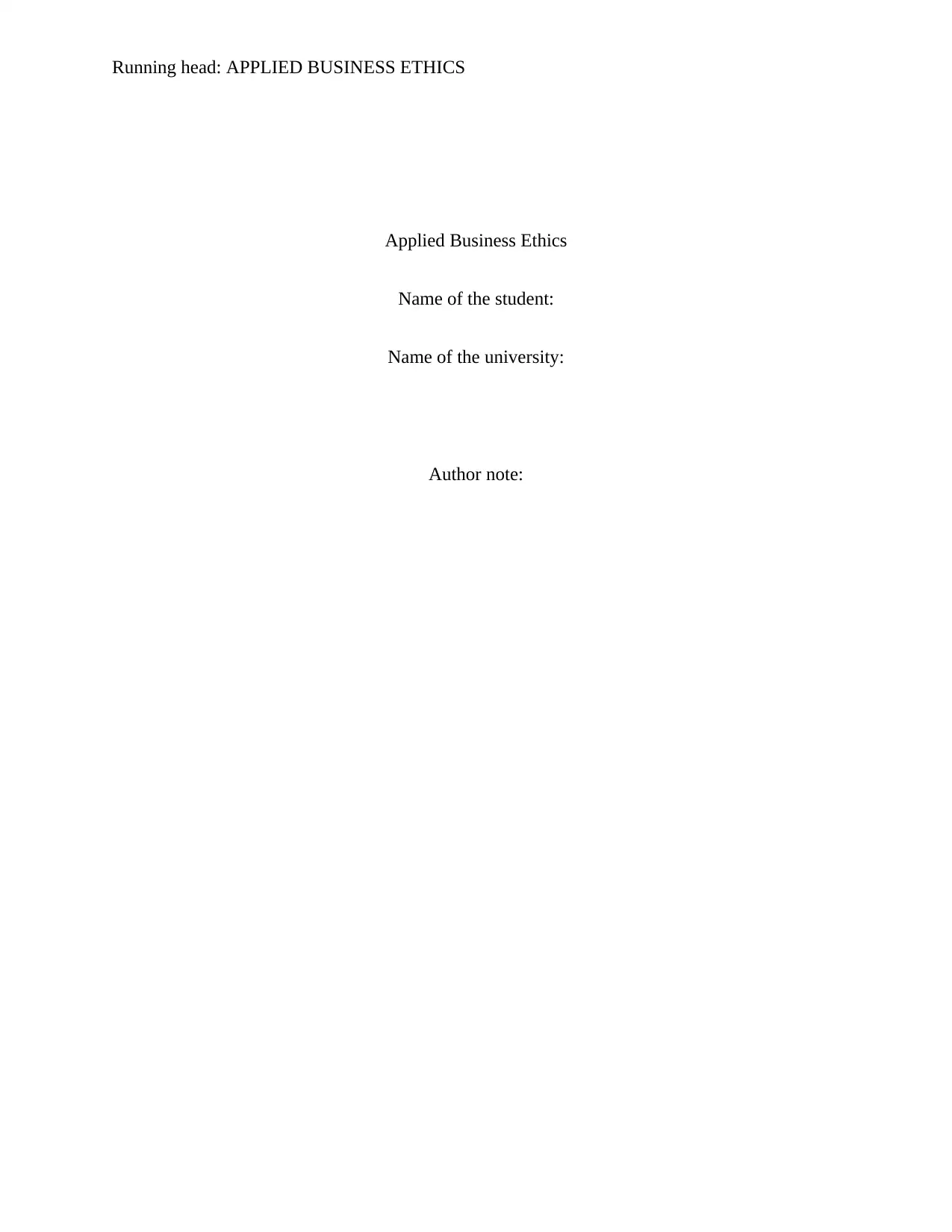
Running head: APPLIED BUSINESS ETHICS
Applied Business Ethics
Name of the student:
Name of the university:
Author note:
Applied Business Ethics
Name of the student:
Name of the university:
Author note:
Paraphrase This Document
Need a fresh take? Get an instant paraphrase of this document with our AI Paraphraser
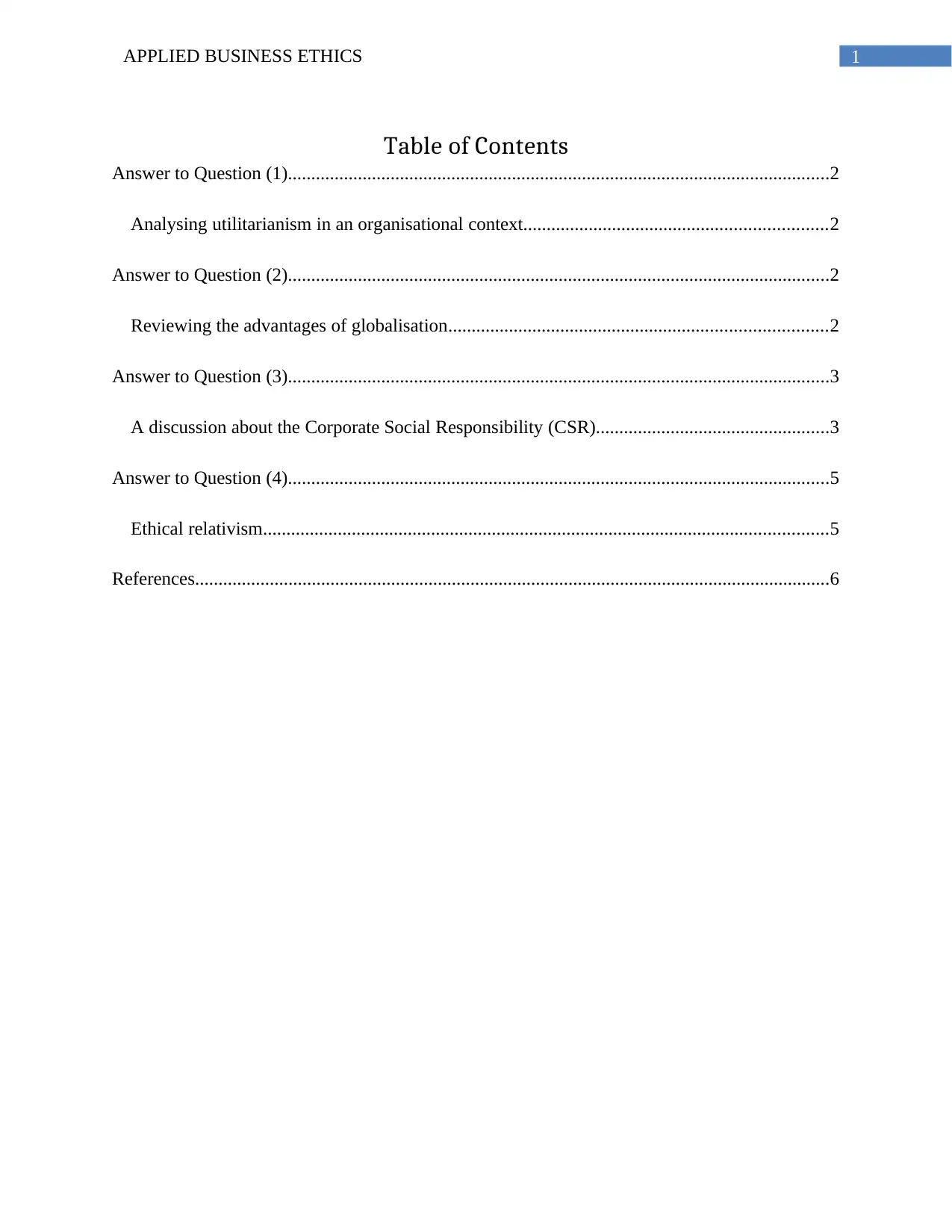
1APPLIED BUSINESS ETHICS
Table of Contents
Answer to Question (1)....................................................................................................................2
Analysing utilitarianism in an organisational context.................................................................2
Answer to Question (2)....................................................................................................................2
Reviewing the advantages of globalisation.................................................................................2
Answer to Question (3)....................................................................................................................3
A discussion about the Corporate Social Responsibility (CSR)..................................................3
Answer to Question (4)....................................................................................................................5
Ethical relativism.........................................................................................................................5
References........................................................................................................................................6
Table of Contents
Answer to Question (1)....................................................................................................................2
Analysing utilitarianism in an organisational context.................................................................2
Answer to Question (2)....................................................................................................................2
Reviewing the advantages of globalisation.................................................................................2
Answer to Question (3)....................................................................................................................3
A discussion about the Corporate Social Responsibility (CSR)..................................................3
Answer to Question (4)....................................................................................................................5
Ethical relativism.........................................................................................................................5
References........................................................................................................................................6
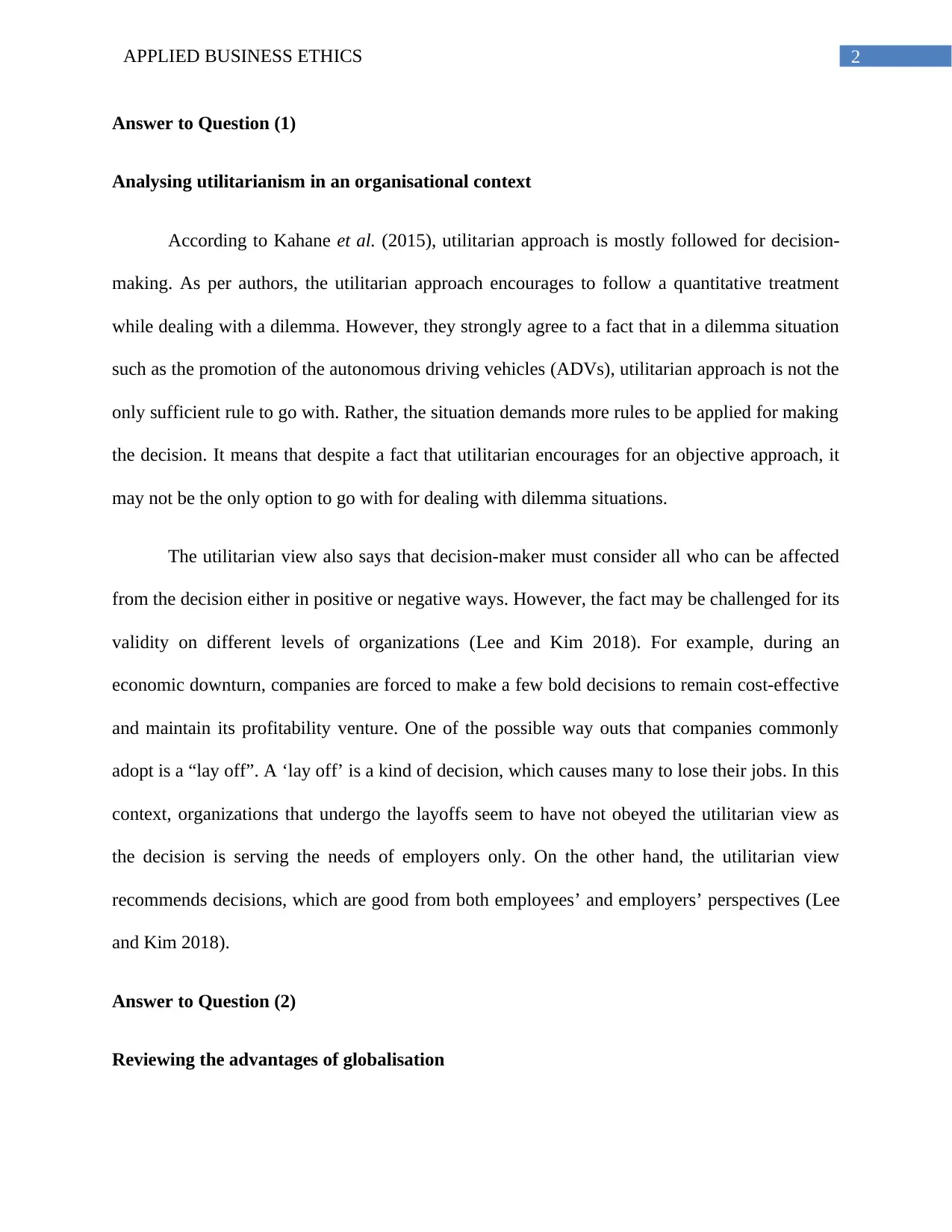
2APPLIED BUSINESS ETHICS
Answer to Question (1)
Analysing utilitarianism in an organisational context
According to Kahane et al. (2015), utilitarian approach is mostly followed for decision-
making. As per authors, the utilitarian approach encourages to follow a quantitative treatment
while dealing with a dilemma. However, they strongly agree to a fact that in a dilemma situation
such as the promotion of the autonomous driving vehicles (ADVs), utilitarian approach is not the
only sufficient rule to go with. Rather, the situation demands more rules to be applied for making
the decision. It means that despite a fact that utilitarian encourages for an objective approach, it
may not be the only option to go with for dealing with dilemma situations.
The utilitarian view also says that decision-maker must consider all who can be affected
from the decision either in positive or negative ways. However, the fact may be challenged for its
validity on different levels of organizations (Lee and Kim 2018). For example, during an
economic downturn, companies are forced to make a few bold decisions to remain cost-effective
and maintain its profitability venture. One of the possible way outs that companies commonly
adopt is a “lay off”. A ‘lay off’ is a kind of decision, which causes many to lose their jobs. In this
context, organizations that undergo the layoffs seem to have not obeyed the utilitarian view as
the decision is serving the needs of employers only. On the other hand, the utilitarian view
recommends decisions, which are good from both employees’ and employers’ perspectives (Lee
and Kim 2018).
Answer to Question (2)
Reviewing the advantages of globalisation
Answer to Question (1)
Analysing utilitarianism in an organisational context
According to Kahane et al. (2015), utilitarian approach is mostly followed for decision-
making. As per authors, the utilitarian approach encourages to follow a quantitative treatment
while dealing with a dilemma. However, they strongly agree to a fact that in a dilemma situation
such as the promotion of the autonomous driving vehicles (ADVs), utilitarian approach is not the
only sufficient rule to go with. Rather, the situation demands more rules to be applied for making
the decision. It means that despite a fact that utilitarian encourages for an objective approach, it
may not be the only option to go with for dealing with dilemma situations.
The utilitarian view also says that decision-maker must consider all who can be affected
from the decision either in positive or negative ways. However, the fact may be challenged for its
validity on different levels of organizations (Lee and Kim 2018). For example, during an
economic downturn, companies are forced to make a few bold decisions to remain cost-effective
and maintain its profitability venture. One of the possible way outs that companies commonly
adopt is a “lay off”. A ‘lay off’ is a kind of decision, which causes many to lose their jobs. In this
context, organizations that undergo the layoffs seem to have not obeyed the utilitarian view as
the decision is serving the needs of employers only. On the other hand, the utilitarian view
recommends decisions, which are good from both employees’ and employers’ perspectives (Lee
and Kim 2018).
Answer to Question (2)
Reviewing the advantages of globalisation
⊘ This is a preview!⊘
Do you want full access?
Subscribe today to unlock all pages.

Trusted by 1+ million students worldwide
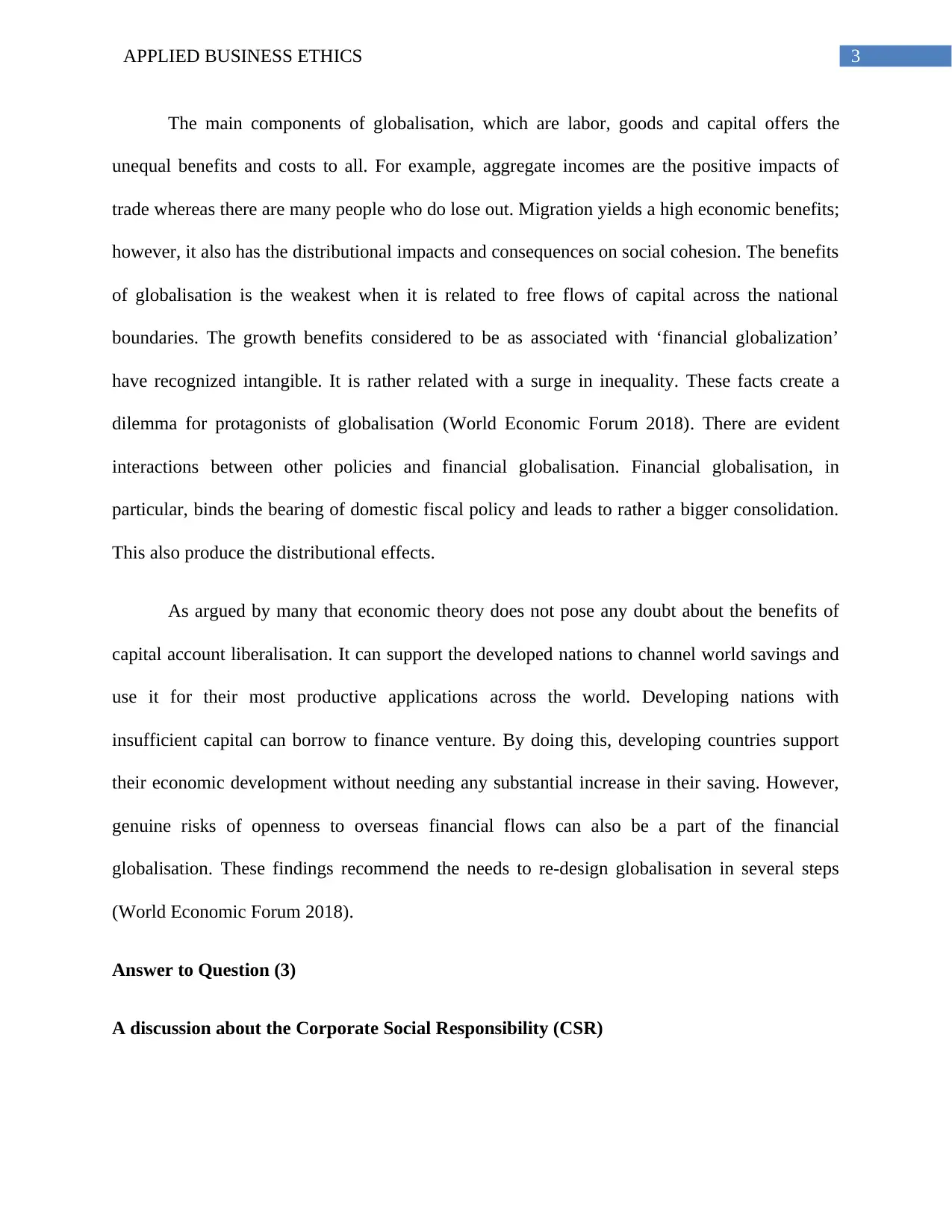
3APPLIED BUSINESS ETHICS
The main components of globalisation, which are labor, goods and capital offers the
unequal benefits and costs to all. For example, aggregate incomes are the positive impacts of
trade whereas there are many people who do lose out. Migration yields a high economic benefits;
however, it also has the distributional impacts and consequences on social cohesion. The benefits
of globalisation is the weakest when it is related to free flows of capital across the national
boundaries. The growth benefits considered to be as associated with ‘financial globalization’
have recognized intangible. It is rather related with a surge in inequality. These facts create a
dilemma for protagonists of globalisation (World Economic Forum 2018). There are evident
interactions between other policies and financial globalisation. Financial globalisation, in
particular, binds the bearing of domestic fiscal policy and leads to rather a bigger consolidation.
This also produce the distributional effects.
As argued by many that economic theory does not pose any doubt about the benefits of
capital account liberalisation. It can support the developed nations to channel world savings and
use it for their most productive applications across the world. Developing nations with
insufficient capital can borrow to finance venture. By doing this, developing countries support
their economic development without needing any substantial increase in their saving. However,
genuine risks of openness to overseas financial flows can also be a part of the financial
globalisation. These findings recommend the needs to re-design globalisation in several steps
(World Economic Forum 2018).
Answer to Question (3)
A discussion about the Corporate Social Responsibility (CSR)
The main components of globalisation, which are labor, goods and capital offers the
unequal benefits and costs to all. For example, aggregate incomes are the positive impacts of
trade whereas there are many people who do lose out. Migration yields a high economic benefits;
however, it also has the distributional impacts and consequences on social cohesion. The benefits
of globalisation is the weakest when it is related to free flows of capital across the national
boundaries. The growth benefits considered to be as associated with ‘financial globalization’
have recognized intangible. It is rather related with a surge in inequality. These facts create a
dilemma for protagonists of globalisation (World Economic Forum 2018). There are evident
interactions between other policies and financial globalisation. Financial globalisation, in
particular, binds the bearing of domestic fiscal policy and leads to rather a bigger consolidation.
This also produce the distributional effects.
As argued by many that economic theory does not pose any doubt about the benefits of
capital account liberalisation. It can support the developed nations to channel world savings and
use it for their most productive applications across the world. Developing nations with
insufficient capital can borrow to finance venture. By doing this, developing countries support
their economic development without needing any substantial increase in their saving. However,
genuine risks of openness to overseas financial flows can also be a part of the financial
globalisation. These findings recommend the needs to re-design globalisation in several steps
(World Economic Forum 2018).
Answer to Question (3)
A discussion about the Corporate Social Responsibility (CSR)
Paraphrase This Document
Need a fresh take? Get an instant paraphrase of this document with our AI Paraphraser
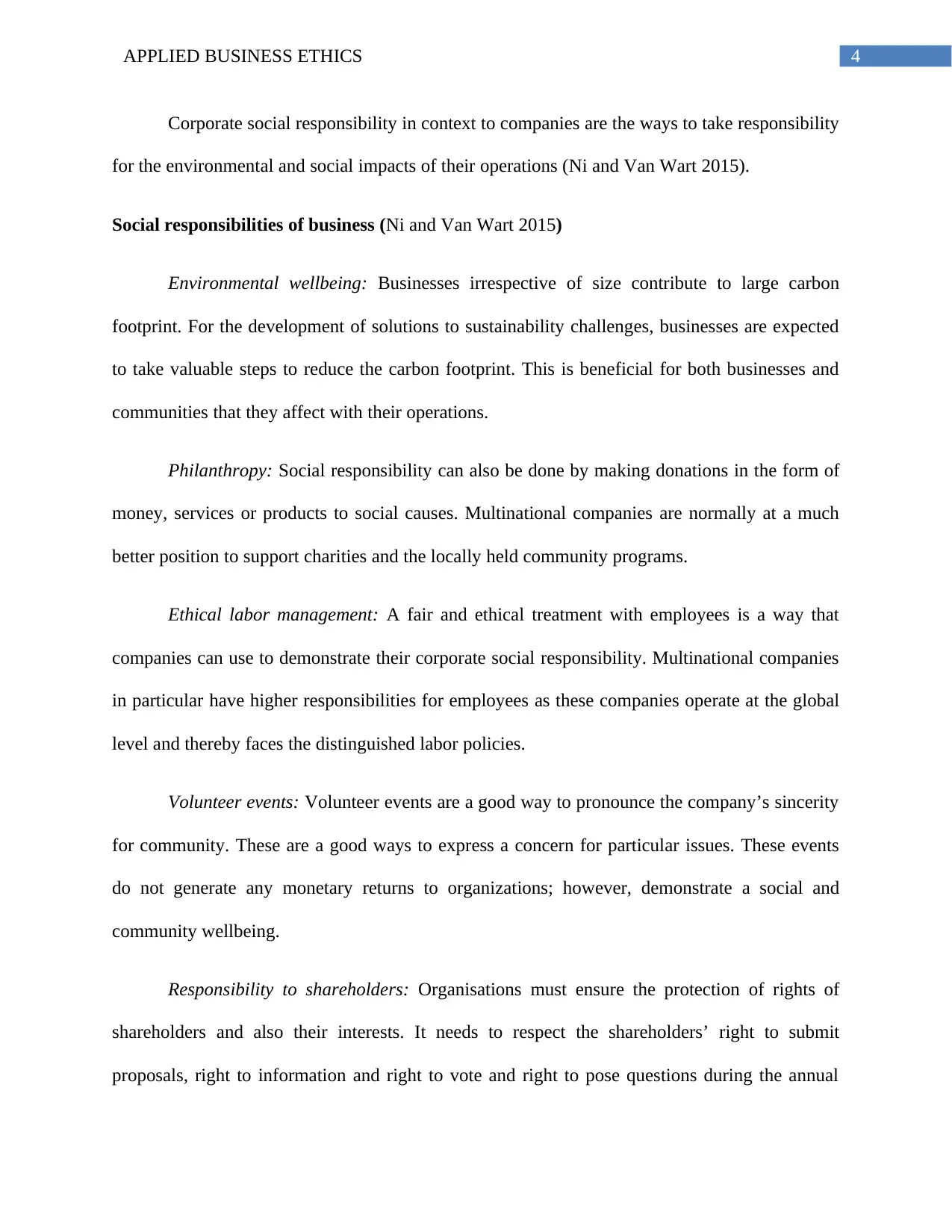
4APPLIED BUSINESS ETHICS
Corporate social responsibility in context to companies are the ways to take responsibility
for the environmental and social impacts of their operations (Ni and Van Wart 2015).
Social responsibilities of business (Ni and Van Wart 2015)
Environmental wellbeing: Businesses irrespective of size contribute to large carbon
footprint. For the development of solutions to sustainability challenges, businesses are expected
to take valuable steps to reduce the carbon footprint. This is beneficial for both businesses and
communities that they affect with their operations.
Philanthropy: Social responsibility can also be done by making donations in the form of
money, services or products to social causes. Multinational companies are normally at a much
better position to support charities and the locally held community programs.
Ethical labor management: A fair and ethical treatment with employees is a way that
companies can use to demonstrate their corporate social responsibility. Multinational companies
in particular have higher responsibilities for employees as these companies operate at the global
level and thereby faces the distinguished labor policies.
Volunteer events: Volunteer events are a good way to pronounce the company’s sincerity
for community. These are a good ways to express a concern for particular issues. These events
do not generate any monetary returns to organizations; however, demonstrate a social and
community wellbeing.
Responsibility to shareholders: Organisations must ensure the protection of rights of
shareholders and also their interests. It needs to respect the shareholders’ right to submit
proposals, right to information and right to vote and right to pose questions during the annual
Corporate social responsibility in context to companies are the ways to take responsibility
for the environmental and social impacts of their operations (Ni and Van Wart 2015).
Social responsibilities of business (Ni and Van Wart 2015)
Environmental wellbeing: Businesses irrespective of size contribute to large carbon
footprint. For the development of solutions to sustainability challenges, businesses are expected
to take valuable steps to reduce the carbon footprint. This is beneficial for both businesses and
communities that they affect with their operations.
Philanthropy: Social responsibility can also be done by making donations in the form of
money, services or products to social causes. Multinational companies are normally at a much
better position to support charities and the locally held community programs.
Ethical labor management: A fair and ethical treatment with employees is a way that
companies can use to demonstrate their corporate social responsibility. Multinational companies
in particular have higher responsibilities for employees as these companies operate at the global
level and thereby faces the distinguished labor policies.
Volunteer events: Volunteer events are a good way to pronounce the company’s sincerity
for community. These are a good ways to express a concern for particular issues. These events
do not generate any monetary returns to organizations; however, demonstrate a social and
community wellbeing.
Responsibility to shareholders: Organisations must ensure the protection of rights of
shareholders and also their interests. It needs to respect the shareholders’ right to submit
proposals, right to information and right to vote and right to pose questions during the annual
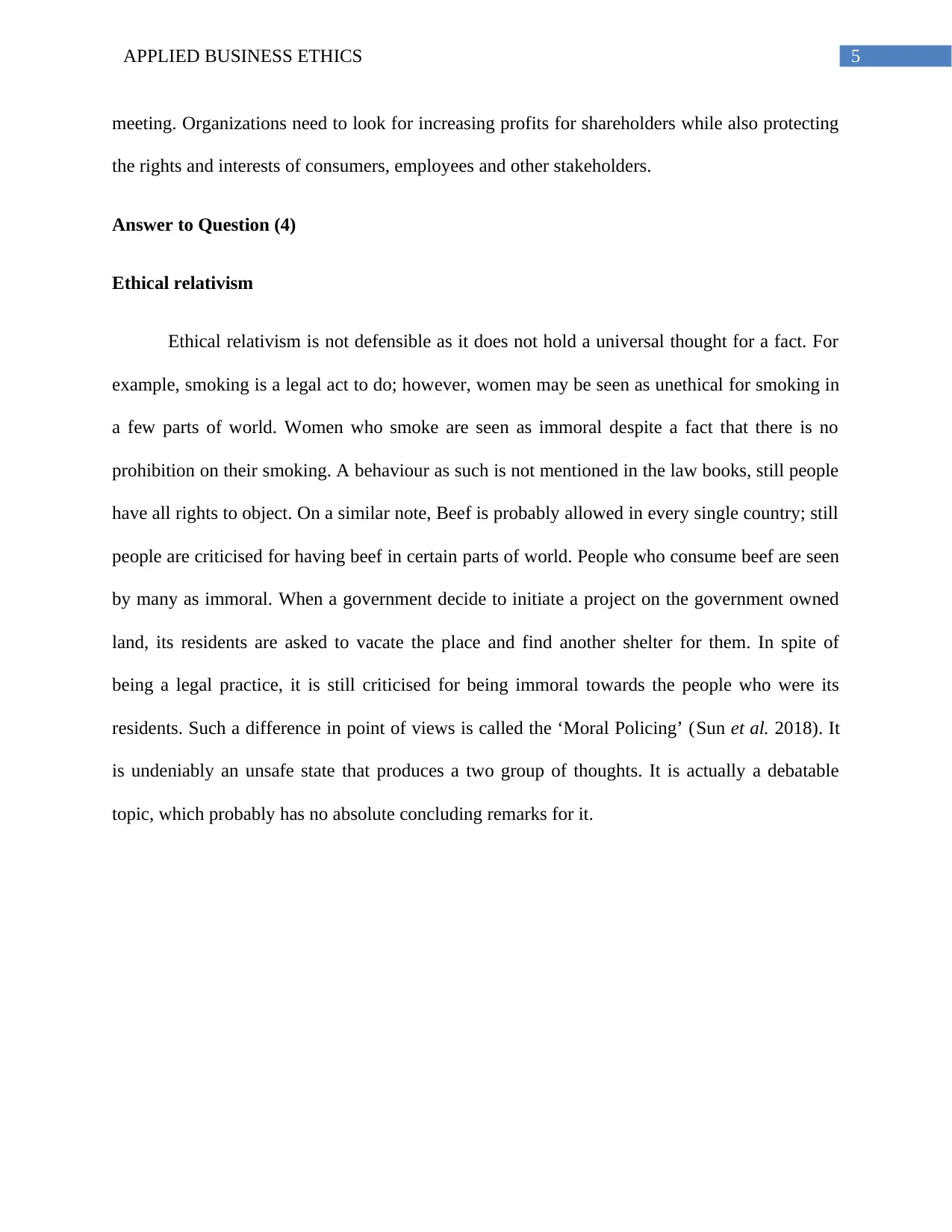
5APPLIED BUSINESS ETHICS
meeting. Organizations need to look for increasing profits for shareholders while also protecting
the rights and interests of consumers, employees and other stakeholders.
Answer to Question (4)
Ethical relativism
Ethical relativism is not defensible as it does not hold a universal thought for a fact. For
example, smoking is a legal act to do; however, women may be seen as unethical for smoking in
a few parts of world. Women who smoke are seen as immoral despite a fact that there is no
prohibition on their smoking. A behaviour as such is not mentioned in the law books, still people
have all rights to object. On a similar note, Beef is probably allowed in every single country; still
people are criticised for having beef in certain parts of world. People who consume beef are seen
by many as immoral. When a government decide to initiate a project on the government owned
land, its residents are asked to vacate the place and find another shelter for them. In spite of
being a legal practice, it is still criticised for being immoral towards the people who were its
residents. Such a difference in point of views is called the ‘Moral Policing’ (Sun et al. 2018). It
is undeniably an unsafe state that produces a two group of thoughts. It is actually a debatable
topic, which probably has no absolute concluding remarks for it.
meeting. Organizations need to look for increasing profits for shareholders while also protecting
the rights and interests of consumers, employees and other stakeholders.
Answer to Question (4)
Ethical relativism
Ethical relativism is not defensible as it does not hold a universal thought for a fact. For
example, smoking is a legal act to do; however, women may be seen as unethical for smoking in
a few parts of world. Women who smoke are seen as immoral despite a fact that there is no
prohibition on their smoking. A behaviour as such is not mentioned in the law books, still people
have all rights to object. On a similar note, Beef is probably allowed in every single country; still
people are criticised for having beef in certain parts of world. People who consume beef are seen
by many as immoral. When a government decide to initiate a project on the government owned
land, its residents are asked to vacate the place and find another shelter for them. In spite of
being a legal practice, it is still criticised for being immoral towards the people who were its
residents. Such a difference in point of views is called the ‘Moral Policing’ (Sun et al. 2018). It
is undeniably an unsafe state that produces a two group of thoughts. It is actually a debatable
topic, which probably has no absolute concluding remarks for it.
⊘ This is a preview!⊘
Do you want full access?
Subscribe today to unlock all pages.

Trusted by 1+ million students worldwide
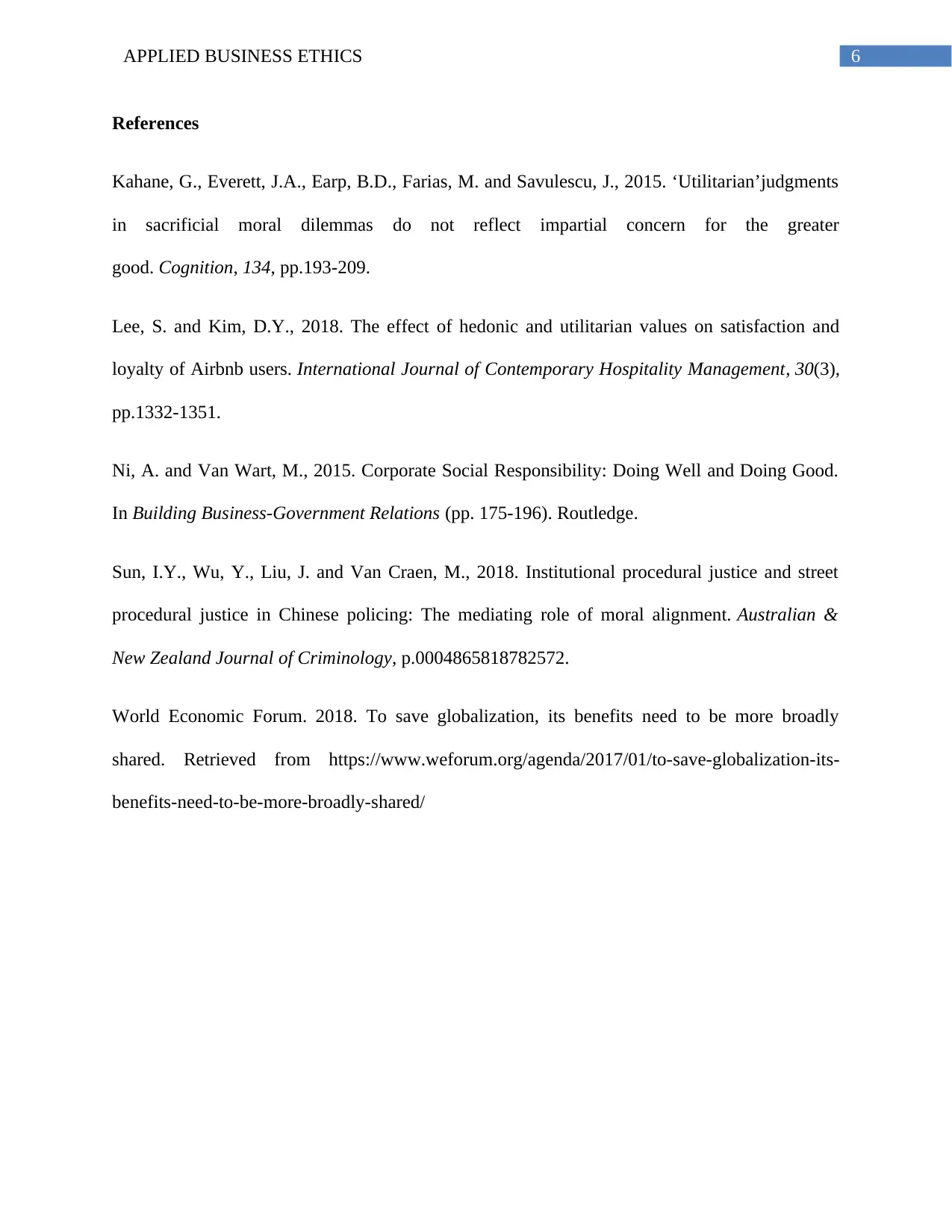
6APPLIED BUSINESS ETHICS
References
Kahane, G., Everett, J.A., Earp, B.D., Farias, M. and Savulescu, J., 2015. ‘Utilitarian’judgments
in sacrificial moral dilemmas do not reflect impartial concern for the greater
good. Cognition, 134, pp.193-209.
Lee, S. and Kim, D.Y., 2018. The effect of hedonic and utilitarian values on satisfaction and
loyalty of Airbnb users. International Journal of Contemporary Hospitality Management, 30(3),
pp.1332-1351.
Ni, A. and Van Wart, M., 2015. Corporate Social Responsibility: Doing Well and Doing Good.
In Building Business-Government Relations (pp. 175-196). Routledge.
Sun, I.Y., Wu, Y., Liu, J. and Van Craen, M., 2018. Institutional procedural justice and street
procedural justice in Chinese policing: The mediating role of moral alignment. Australian &
New Zealand Journal of Criminology, p.0004865818782572.
World Economic Forum. 2018. To save globalization, its benefits need to be more broadly
shared. Retrieved from https://www.weforum.org/agenda/2017/01/to-save-globalization-its-
benefits-need-to-be-more-broadly-shared/
References
Kahane, G., Everett, J.A., Earp, B.D., Farias, M. and Savulescu, J., 2015. ‘Utilitarian’judgments
in sacrificial moral dilemmas do not reflect impartial concern for the greater
good. Cognition, 134, pp.193-209.
Lee, S. and Kim, D.Y., 2018. The effect of hedonic and utilitarian values on satisfaction and
loyalty of Airbnb users. International Journal of Contemporary Hospitality Management, 30(3),
pp.1332-1351.
Ni, A. and Van Wart, M., 2015. Corporate Social Responsibility: Doing Well and Doing Good.
In Building Business-Government Relations (pp. 175-196). Routledge.
Sun, I.Y., Wu, Y., Liu, J. and Van Craen, M., 2018. Institutional procedural justice and street
procedural justice in Chinese policing: The mediating role of moral alignment. Australian &
New Zealand Journal of Criminology, p.0004865818782572.
World Economic Forum. 2018. To save globalization, its benefits need to be more broadly
shared. Retrieved from https://www.weforum.org/agenda/2017/01/to-save-globalization-its-
benefits-need-to-be-more-broadly-shared/
1 out of 7
Related Documents
Your All-in-One AI-Powered Toolkit for Academic Success.
+13062052269
info@desklib.com
Available 24*7 on WhatsApp / Email
![[object Object]](/_next/static/media/star-bottom.7253800d.svg)
Unlock your academic potential
Copyright © 2020–2026 A2Z Services. All Rights Reserved. Developed and managed by ZUCOL.




